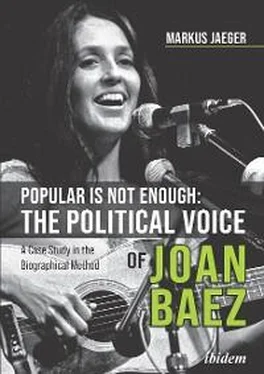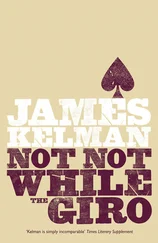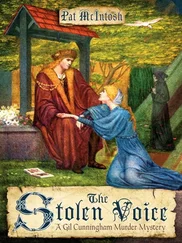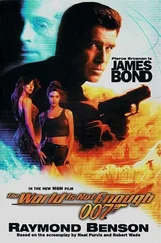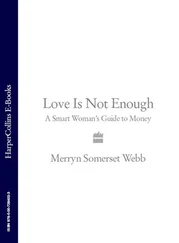ibidem-Press, Stuttgart
Dedicated to the sister to my soul since 1987,
Susanne Rundl, without whose friendship
I would be an entirely different person.
And to Janice Schiestl, my former teacher
and now dear friend, without whose support
this book would not have been possible.
I think one of the saddest and stupidest things in our world is the segregation and discrimination of different races […] (Joan Baez, 1955).
There’s a consensus out that it’s OK to kill when your government decides who to kill. If you kill inside the country you get in trouble. If you kill outside the country, right time, right season, latest enemy, you get a medal […] (Joan Baez, 1968).
[…] people play this very loud music so they won’t have to confront the quietness. They don’t want to think about death. A lot of my songs, especially the songs I first played, were about death […] (Joan Baez, 1976).
The prevailing ethos is: No negative thoughts, and everything is beautiful. You just jog, eat enough of the right yogurt, and everything is going to be all right […] (Joan Baez, 1987).
It was simply a case of saying I would quietly disappear from mainstream music or fight my way back in, as a result, I have made a commitment to my own career […] (Joan Baez, 1990).
I did have a flight booked and a hotel booked and the final agreement, yes. Maybe four days before the concert, then I was told that I was not approved […] (Joan Baez, 2007).
That’s my little song/ about a man gone wrong./ He’s nasty from his head to his feet./ When the dirt on this man / finally hits the fan,/ and no one gives a damn about his tweets,/ he’ll be finally and forever obsolete […] (Joan Baez, 2017).
Table of Contents
Introduction
1. Stepping Over Boundaries: Materials, Methodology and Theory
Introduction
1.1 Against Wrongful Restrictions: On the Advantages of Interdisciplinarity
1.2 Reconstituting Culture: On the Significance of Social Movements
1.3 Life Is the Method: On the Sisterhood of Biography and Society
1.4 Popular Is Not Enough: On Popular Culture and Politics
1.5 A Critical View of a Critical Theorist: How a Bad Frankfurt Pupil Can Still Be Politically Active
1.5.1 Music for More Than Music’s Sake: On the Credibility of Politically Engaged Artists
1.5.2 Words Do Not Change Society: Theory Versus Practice
1.5.2.1 On Fictitious Freedom
1.5.2.2 On the Credibility of Hazy Categories
1.5.2.3 On the Passiveness of Theories
2. “The Kingdom of Childhood”: Major Moments of the 1950s
Introduction
2.1 Religion Without Violence: Joan Baez and the Quakers
2.2 Becoming Someone Who Was Alright: On Singing Against Isolation
2.3 The Birth of a Passion: Iraq, 1951
2.4 Preparing for the March on Washington: Joan Baez and Dr. Martin Luther King, Jr.
2.5 Another Teacher of Pacifism: Jewish Scholar Ira Sandperl
3. On Refusal Without Violence: Joan Baez and Henry David Thoreau
4. High School Activist and Folk Music Revivalist
Introduction
4.1 Conservative Nostalgia About the 1950s
4.2 Pedagogy of Paranoia: Activist for the First Time
4.3 The Soundtrack of the American Counterculture: Joan Baez and the Folk Music Revival
5. Postwar Fractures in Society: Joan Baez in the 1960s
Introduction
5.1 Doubted Demarcations: American Society and Change in the 1960s
5.2 Going Further than Allowed: Joan Baez and the Civil Rights Movement
5.3 When Students More than Studied: Joan Baez and the Free Speech Movement
5.4 Playing Domino: Joan Baez Against the Vietnam War
6. A Roller Coaster Decade: Joan Baez in the 1970s
Introduction
6.1 In the Shadow: The Comeback of Conservatism
6.2 No Matter What Their Crime Is: Joan Baez and Political Prisoners
6.3 The Normality of Otherness: Joan Baez and the Gay Liberation Movement
6.4 Life Saving Songs: Joan Baez in South East Asia After the Vietnam War
7. A Narcissistic Decade: Joan Baez in the 1980s
Introduction
7.1 The Political Meaning of Yogurt: Ramboism and Music in the 1980s
7.2 Causing Troubles: Joan Baez in Latin America
7.3 Organized Non-Violence Once More: Joan Baez in Poland
7.4 Singing for the Velvet Revolution: Joan Baez in Czechoslovakia
8. Gone from Danger: Joan Baez in the 1990s
Introduction
8.1 Still Speaking of Dreams: On Different Definitions of Energetic Change
8.2 Singing at the Frontier Lines: Joan Baez in Sarajevo
9. A Lifetime Achievement: Joan Baez in the 2000s
Introduction
9.1 War En Vogue Once More: Consequences of 9/11
9.2 Veterans and Mothers Against the War Once More: Joan Baez and Cindy Sheehan
9.3 Censorship Once More: Joan Baez Not Allowed to Sing at Walter Reed Army Medical Center
10. In Times of Nasty Men: Joan Baez in the 2010s
Introduction
10.1 In the Hall of Fame: Musical and Political Accolades
10.2 In Times of Nasty Men: Opposition to Donald Trump
Conclusion
Bibliography
Acknowledgements
Curriculum Vitae
When artistic expression engages with political activism, unavoidably arising doubts tend to result in forthright lack of differentiation. The choice of artistic genre, political attitude, ideological background and specific political demands of those who are involved in offering their audiences a mixture of art and activism repeatedly leads to heated debates about the authenticity of politically active artists. This case study aims to find an answer to the question of whether a generalization about such credibility can be considered as intellectually satisfying or not. Its line of argumentation points out that lavishing care and attention on passionately upheld convictions like the alleged impracticality of popular music in relation to activist work might perhaps be not enough to adequately analyze the connection of artistic expression with political activism.
The current study explores the coalescence of Joan Baez’s work as a singer and songwriter with her endeavors as a political activist throughout the last sixty years. It aspires to illustrate an American popular singer’s significance as a political activist—for her audiences, for her opponents, as well as for those victims of politically organized violence who have profited from her work. Baez has never clearly separated her artistic work from her efforts as a political activist and in this sense has continually falsified Theodor W. Adorno’s rigid pessimistic view on the political potential of popular music. Her attainments during the most successful decade of her career—the 1960s—have been co-influential for a whole generation’s political conscience. Baez later resorted to this fame when she used her reputation to publicly speak, act and sing out against war and other kinds of organized violence from either the right or the left side of the political spectrum. More than once, she has been able to save numerous lives in the course of her activities (see, for example, Chapter 6.4).
The journalistic material on Joan Baez throughout more than half a century would fill libraries; the growth of published serious scholarly material about Baez, however, is still in its infancy. Countless scientific sources on topics like the Civil Rights Movement, the Vietnam War, political prisoners in Latin America and all the numerous other dimensions of her work positively refer to Baez and repeatedly point out the significance of her work. They are, nevertheless, not dealing with the topic of Joan Baez on a general level. One very well written and highly recommandable exception is German musicologist Jens Rosteck’s book Joan Baez. Porträt einer Unbeugsamen (in German, Osburg Verlag, 2017). The most comprehensive bibliographical source of information to start any form of research on Baez, however, is Charles Fuss’ highly recommendable informative bio-bibliography of 1996 (see also Fuss, 1996).
Читать дальше
